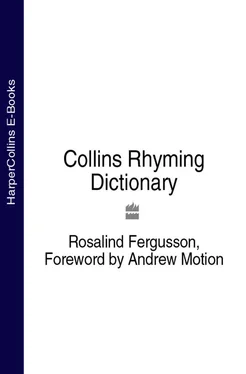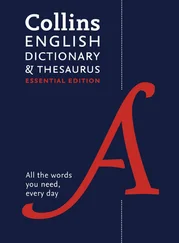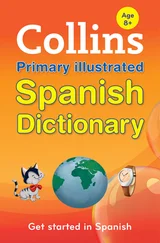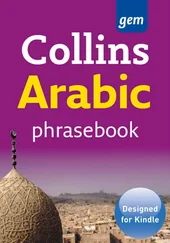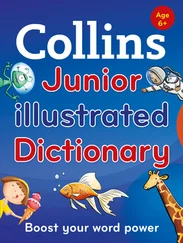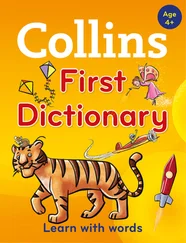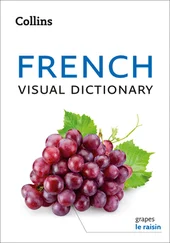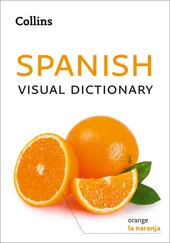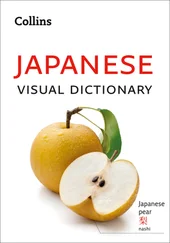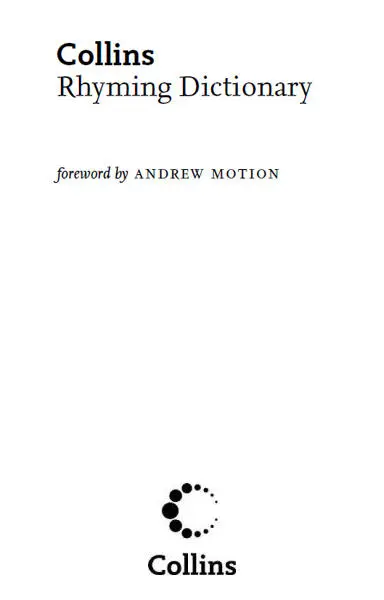
Contents
Cover
Title Page
Foreword by Andrew Motion
Using the dictionary
Dictionary
-a-
-ah-
-air-
-ay-
-e-
-er-
-eer-
-ee-
-i-
-ire-
-ie-
-o-
-or-
-oor-
-ow-
-ower-
-oy-
-oe-
-u-
-uu-
-oo-
Index
Copyright
About the Publisher
by Andrew Motion, Poet Laureate
Like a lot of people born shortly after the war, and starting to read poems in the 1960s, I was brought up to think that rhyming poetry was done for. My teachers regretted it, but the evidence of the contemporary they liked best (Ted Hughes), and the rising chorus of radical poets appearing at the Albert Hall and elsewhere, told them the great modernist experiment with free verse during the 1910s and ’20s was about to sweep all before it.
In fact things haven’t turned out like that. From the vantage point of a new century, we can see that although the modernist experiment has flourished and diversified, it has done so alongside a continuing tradition of poets doing the old things in new ways. In Great Britain, the rhyming line from Auden and the poets of the 1930s, through Betjeman and Larkin, has been extended through most of the major poets of the late c20, and forward into the best of our contemporaries.
Why is this? Loss of nerve? Another example of local reactionary instincts? I don’t think so. Rhyming poetry – and rhyme in poems which have no settled formal pattern – has survived because it is fundamental to our sense of what poetry is, and what it can achieve. Most of us make our first acquaintance with it in the playground, chanting and playing word games. We learn that rhyme brings words to life, gets them to dance, and makes them memorable. If we forget this later on, when we develop a more elaborate sense of language and a more sophisticated idea of composition, we do so at our peril.
But this isn’t to say metre has to be tum-ti-tum, and rhyme has to be obvious and orthodox. One of the best things about this excellent book is that it encourages us to think broadly about rhyme – to explore part-rhymes, para-rhymes and half-rhymes as well as full and complete ones. It’s easy to use, resourceful in its listing, and ambitious in its reach.
Will people who are already ‘professional’ writers feel it’s somehow beneath them to use it? They shouldn’t. One of the greatest pleasures of poetry, for its authors as well as its readers, is the way it combines a sincere exploration of the world and the self with a delight in tricks and playfulness. To varying degrees, poets are able to devise these games in the solitude of their own heads – but as with everything else in life, a little help never comes amiss. This help might clarify an internal process that is already under way. It might equally well lead to something unexpected and unplanned. Byron was not the only poet to admit that ‘a rhyme led me to a thought’.
Back at school in the ’60s, I mistakenly thought that rhyme was a hindrance: a way of blocking or re-routing what I ‘really wanted to say’. I soon saw the error of my ways. Rhyme – in all its delightful diversity of forms – is a reliable way to recognise and release strong feeling, as well as smart thinking, elegant compression and proper concentration. In this respect, the extent to which it appears ‘unnatural’ (in the sense that we don’t usually chat away to one another in rhyme) conceals a vital paradox. The ingenuity of rhyme is in fact a way of proving what is intrinsic to us as human beings.
Using the dictionary
How the words are arranged
The rhymes are arranged in sections according to the main vowel sound of the word. The first half of each section contains words with this sound as their final or only vowel sound (e.g. cat and unpack in the -a-section); the second half contains words with this sound followed by one or more weaker syllables (e.g. happy and examiner ). The sections are as follows, in this order:
-a-(as in mat , unpack , happy , examiner )
-ah-(as in half , depart , larder , impartially )
-air-(as in hair , unfair , scarcely , bearable )
-ay-(as in same , display , waiting , Australia )
-e-(as in pen , infect , ready , separate )
-er-(as in her , return , working , university )
-eer-(as in beer , revere , fiercely , endearment )
-ee-(as in breed , complete , teacher , meaningless )
-i-(as in sit , evict , whistle , revision )
-ire-(as in tire , require , admirer , violently )
-ie-(as in try , untie , glider , reliable )
-o-(as in toss , forgot , copper , historical )
-or-(as in ford , implore , daughter , victorious )
-oor-(as in cure , endure , purely , maturity )
-ow-(as in cow , endow , louder , boundary )
-ower-(as in hour , empower , towering , floury )
-oy-(as in toy , enjoy , noisy , avoidable )
-oe-(as in boat , ago , grocer , totally )
-u-(as in run , instruct , double , gluttony )
-uu-(as in put , withstood , booking , womanly )
-oo-(as in too , rebuke , cruiser , beautiful )
Within each section, the words are arranged in numbered groups according to the sound that follows this vowel (e.g. at/bat/cat , adder/ladder/madder ). Many of these groups contain words that are close but not perfect rhymes (e.g. hammer/banner ), to give you a fuller range of possibilities.
Within each numbered group, the rhymes are divided by asterisks into sets of words with the same number of syllables (e.g. hack , jack , pack * aback , attack , repack ) or with the same rhythm (e.g. aback , attack , repack * hatchback , knapsack , tailback ).
How to find a particular rhyme
If you are looking for a rhyme for a particular word, the easiest way is to use the index at the back of the book, which will guide you to the numbered group in which your word appears. For example, batter is in group 2.10. Once you have found this group, cast your eye over all the words – you may find a close rhyme some distance away (e.g. regatta and antimatter ). Some of the longer sets of rhymes, e.g. the -ation words, have been divided into several smaller groups, so it is always a good idea to look at the groups above and below the one containing the word you are trying to rhyme.
Читать дальше
